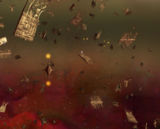
|
This wiki is closed in favour of the new wiki. Information shown is likely to be very out of date. |
Hazardous Areas
Areas throughout the Sirius that are hard or dangerous to travel are classified as hazardous. They vary from industrial waste clouds to fields of radiation to man-made minefields. Many of these areas contain jump holes or wrecks of unfortunate disabled ships.
Clouds/Nebulas
These occur both naturally as well as as a direct result of human actions, like the dumping of industrial waste directly into space. While they are not physically dangerous, they dampen sensor equipment, dramatically reducing detection and cargo scanning range. Many pirates and dissidents successfully use such clouds to hide their staging areas or to escape pursuers.
A good example of a thick cloud is the Giftnebel in Dresden, created from vast quantities of poisonous gases and waste emitted by the refineries in the system.
Asteroid Fields
A dense field of rocks in space. While most modern shields installed on ships are strong enough to protect against individual collisions, bigger ships are unable to navigate through them due to their size.
A very typical dense asteroid field can be found in Magellan system, and is rumoured to hide the legendary Mactan base of the Lane Hackers
Radioactive Clouds and Radiation Belts
Radioactivity is especially dangerous to lightly armoured ships, due to it's impact on the electronics and other devices onboard. Enough radiation exposure can disable the ships reactor systems, and effectively destroy the vessel. Ships operating in systems with high radiation emissions incur considerable costs for ship maintenance and repairs. Standard issue Nanobots can typically clean up the ships' systems from the harmful radioactive particles and restore the ship's damaged components temporarily, should the pilot be too far away from a friendly base to land for repairs.

Radioactive pockets can frequently be found within nebulas and clouds, as well as asteroid fields. They are generally marked with hazard buoys by local inhabitants, to warn passers by of the danger. Beware however, as some pockets are still unmarked and can be potentially deadly to ships straying into them!
Some stars in Sirius emit such vasts amounts of radiation, that the entire system - as well as all passers by - is affected by the strong emissions. A prime example of such a system is Omega-11, which contains a star in it's final stages of life. Radiation amounts affecting a ship in such a system are directly proportional to the ships distance to the star, thus all travelers are advised to fly across the edges of the system, ideally protecting yourself inside dense asteroid fields.
Volatile Gas Pockets
Relatively small gas pockets made of oxygen, which react violently when in contact with the heavily charged ion drives of each ship. This explosion can heavily damage shields, or even destroy a ship, if it is caught in a larger chain reaction of explosions of such gases. Frequently found in the most gaseous systems of the Crow Nebula.
One of the systems known to contain gas pockets is Sigma-13.
Mine Fields
Limiting enemy movements is a tactic used by humanity since centuries. Many conflicts in Sirius produced large mine fields in order to deny easy access to certain areas and improve defense. There are many rumours on Manhattan about the Outcast Cali Base (one of biggest arteries of Cardamine trafficking to the colonies) being hidden behind a BMM mine field in Tau-23. Mines can vary in yield, from only a small impact on shield to instant destruction of the ship in question.